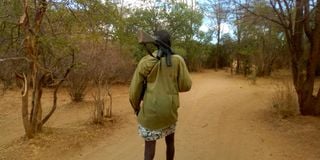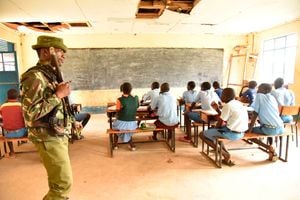
A national police reservist at Amolem village in Kerio Valley. For all their efforts, they earn Sh5,000 monthly, have no medical cover and own a single pair of uniform.
The work of police reservists, who supplement security officers deployed to fight bandits in the insecure North Rift counties, is no walk in the park. Nor is it for the faint of heart.
Their day begins at 3am, when they have to wake up to reach their observation posts on time and take cover.
The reservists are tasked with carrying out routine patrols in more than six deserted villages suspected of being bandits' hideouts. They cover more than 30km on foot each day, traversing rugged terrain under a scorching sun.
*Chemweno (not his real name), who has served for more than five years, says they have a daily routine.
“For security reasons, we avoid walking on the roads or the footpaths to avoid coming into contact with the bandits. The rule is that you walk with a lot of care through the thick bush, as you keep an eye out for the presence of any human being,” the reservist explains to Nation.Africa.
The use of a torch is strictly forbidden to avoid their movements being monitored, he adds.
Despite dedicating all their time to patrolling the bandit-prone villages and protecting the locals, the reservists earn a meagre Sh5,000 a month.
Chemweno was recruited as a National Police Reservist (NPR) in 2016, to complement security officers deployed to restore order in banditry-prone villages in Baringo South.
At the time, he was one of more than 450 police reservists recruited in the insecure areas of Baringo North, Baringo South and Tiaty sub-counties to curb the perennial cattle rustling and banditry attacks that had left hundreds dead and thousands displaced from their homes.
The security officers were deployed to Chepkesin, Kagir, Yatya, Ng'aratuko and Kinyach in Baringo North, while others went to Noosukro, Ruggus, Mukutani and Ng'elecha villages to flush out armed criminals.
However, they were disarmed in May 2019 in what the government said was a registration exercise to capture the biometrics of all reservists. The aim was to ensure that the right people were recruited to serve and not criminals.
Following a spate of attacks and cattle rustling, more than 200 of them were reinstated in Baringo North and Baringo South in May last year after undergoing a month of paramilitary training.
The NPRs, unlike the security officers deployed in the affected villages, are locals who are familiar with the rugged terrain and the hideouts of the armed attackers who wreak havoc in the region.
When they are on duty, they are expected to lie down at observation posts and keep watch until 6pm, when another group takes over, Chemweno explains.
“On bad days, when you can’t afford a meal, we leave our homes very early in the morning, without breakfast, and traverse more than 15kms of the porous deserted villages and bushes. For more than 15 hours, you will stay on an empty stomach until evening. This work needs someone who is committed, otherwise you give up,” he told Nation.Africa on Wednesday.
To avoid being spotted and tracked by armed attackers, each group sets off in a different direction on their assigned days.
“We no longer do our changeover in the bush [as we used to]. When one group returns from the routine patrol, the squad leader informs his counterpart in the other group to take over. This way we are able to know if bandits have intruded villages and any other details,” the NPR explained.
Chemweno and his 52-man squad cover the insecurity-prone Tandar and Korkoron hills, which are known to be a bandits’ paradise.
According to the NPR, it is imperative that they discourage bandits from staging attacks, because once stolen cattle are driven by raiders towards the Korkoron or Ng'elecha hills, the chances of recovering them are minimal.
“There is no accessible road to the two hills, which border dozens of desolate villages where occupants fled due to the series of attacks. This has made it a good hideout for the criminals. Whenever they manage to steal livestock, it is highly unlikely to recover them because they invade in numbers, so a routine patrol is vital,” explains Chemweno.
There is a General Service Unit (GSU) camp in the volatile village of Lamaiywe, at the foot of Korkoron Hill. The unit was deployed in 2022 to restore sanity to the border area. There is only a one-kilometre road from the camp to the bandits' haven.
“Beyond that area, you are forced to manoeuvre the thick criminal-infested bushes on foot,” Chemweno explains.
If there were accessible roads in the notorious Korkoron and Ng'elecha areas, the reservist notes, it would have been easier to repel attackers.
For the reservists, crossing the insecure areas is a gamble because they are not sure they will come out alive. This is because the criminals sit in vantage positions at the top of the hill to monitor those approaching or climbing it from the foothills.
The lack of accessible roads for vehicles worsens the situation, as it means that the roads can only be used on foot, which is very dangerous.
Robbers also take advantage of the poor road network to attack locals or police, steal and disappear into the valleys. The area is also full of hills and valleys, which is to the advantage of the criminals who climb the hilltops to spy.
At one point in 2017, Chemweno recalls, more than 30 reservists climbed the dreaded Korkoron Hill at night in pursuit of stolen cattle. It was no walk in the park, as they had to be careful not to be spotted by the raiders, who were on the lookout for perceived 'enemies'. They did not succeed in recovering the stolen herd on this mission.
*Kipng’etich (not his real name), a reservist in Baringo North, complains that the Sh5,000 they earn is too little compared to the work they are assigned.
“Most of the formed units deployed in the border areas do not go deep into the villages like some of us who walk the entire day on foot deep into the dreaded areas where the criminals hide. They can only patrol along the road. If the government could increase our pay as promised earlier, it would motivate us to do even better. As we speak, we cannot engage in any other activity to earn a living because this work is time consuming,” he said.
After undergoing paramilitary training in March last year, the government gave each of them a pair of uniforms. Kipng'etich says the uniforms are already worn out from daily use in the rugged terrain and the thick bush they traverse.
Nation.Africa also learnt that despite the risks, the NPRs have no medical cover which would be useful if they were injured in an attack.
“It is very important for us to have a medical cover owing to the risks we go through. Just in case you are attacked while on duty, you are forced to dig deeper into your pocket to get treatment. When one of us sustains injuries, the burden goes to relatives and locals because we earn little and cannot afford treatment,” said the distraught reservist.
They cited an incident where their colleague sustained serious gunshot wounds after being attacked by bandits in the insecure Kapindasum village in Baringo South, and they were forced to fundraise for his treatment.
“We appeal to the government to fulfil its promise to cater for our medical insurance cover and also provide uniforms, including footwear,” he said.
While presiding over the graduation of more than 200 National Police Reservists in Kimalel, Baringo South, in May last year, Interior Cabinet Secretary Kithure Kindiki promised that the state would provide the insurance fund and uniforms for the reservists.
“The government will ensure that every NPR in this country is insured under the National Hospital Insurance Fund (NHIF) from July 1, which will also be extended to the members of their families. We will also provide them with full uniform, including footwear, and the government is also reviewing their stipend,” the CS said at the time.











